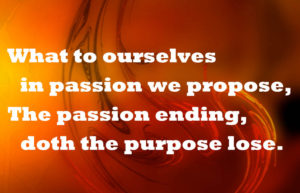 “What to ourselves in passion we propose,
“What to ourselves in passion we propose,
The passion ending, doth the purpose lose.”
(Hamlet, act 3, sc. 2)
Tips for Use. Word of caution when you sense that the enthusiasm detectable at one moment in a group may be only momentary and destined to cool and abate when the passion of the moment is gone. Good words to prevent the effects of rash decusions. Statistically, opinion leans towards the positive side of passion or enthusiasm. The two words converge in meaning after starting from opposite ends. Passion is a Latin word, substantivation of the verb “patire”, to suffer. “Enthusiasm”, instead, is a word of Greek origin, meaning ‘to be inspired or possessed by a God’. Sum of ‘en’ (in) and ‘theos’ (god), that is divinely inspire or possessed by a god. According to Emerson, one of many with almost identical opinions on the subject, “Enthusiasm is one of the most powerful engines of success. When you do a thing, do it with all your might. Put your whole soul into it. Stamp it with your own personality. Be active, be energetic and faithful, and you will accomplish your object. Nothing great was ever achieved without enthusiasm.”
Take a look at the web-page describing the book “Your Daily Shakespeare”, 1390 pages filled to the brim with over 10,000 situations you may find yourself in or involved with, attuned to the perfect Shakespearean repartee that will get you on the stage or at least out of the water – besides making you a winner of verbal contests. “Your Daily Shakespeare” has been described as the most unusual, useful and unique book of Shakespearean quotations. Nothing similar exists or has ever existed.
And if you like this website why not subscribe (see last menu item to the right)? You will get automatically any new blog as well as any other information and novelty that will be forthcoming, including a system to effortlessly (yes) remember hundreds of Shakespearean quotes by heart while having fun in the process. You can also chat with me – please go to the chat-page. And I promise, no sales calls, trade leads, venomous schemes, hidden plots, Machiavellian conspiracies, commercial ploys, psychological tricks, leads exchanges, barter proposals, suggestions or offers of any kind imaginable (and unimaginable).
In the play. The play that Hamlet has produced is full of direct and indirect references to recent real-life events, such as the killing of Hamlet’s father by the new king Claudius through poisoning. Gonzago recites these lines.
Image Source: http://blog.lanartco.com/2011/04/passion-of-life.html
